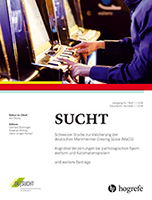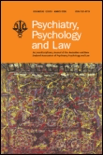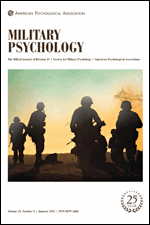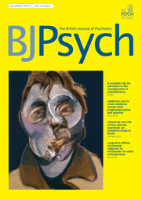
International Journal of Forensic Mental Health
Scope & Guideline
Transforming Forensic Practices through Mental Health Research
Introduction
Aims and Scopes
- Forensic Mental Health Assessment and Treatment:
Research that examines the assessment tools and treatment methodologies for individuals with mental disorders within forensic settings, including evaluations of risk and recovery. - Trauma and its Implications in Forensic Populations:
Studies focusing on the impact of trauma on individuals in forensic settings, exploring trauma-informed care practices and the relationship between trauma history and mental health outcomes. - Cultural and Societal Influences on Forensic Mental Health:
Investigations into how cultural, racial, and social factors affect mental health assessments, treatment practices, and outcomes for forensic patients. - Interventions and Rehabilitation Strategies:
Research on the effectiveness of various psychological and therapeutic interventions aimed at rehabilitating individuals with mental health issues who are involved in the criminal justice system. - Policy and Systematic Reviews:
Critical analyses of existing policies, practices, and frameworks within forensic mental health systems to identify gaps, challenges, and opportunities for improvement.
Trending and Emerging
- Trauma-Informed Care Practices:
An increasing number of studies are exploring trauma-informed care models, emphasizing the need to address trauma in treatment and its impact on recovery and rehabilitation. - Cultural Competence in Forensic Mental Health:
Research focusing on culturally sensitive practices and assessments is on the rise, reflecting a broader awareness of the importance of diversity and inclusion in forensic mental health settings. - Mental Health Interventions in Correctional Settings:
There is a growing interest in evaluating the effectiveness of various mental health interventions specifically designed for incarcerated populations, highlighting the unique challenges faced in these environments. - Patient Participation and Involvement:
Emerging studies emphasize the importance of involving patients in their treatment planning and decision-making processes, recognizing their agency and experiences as critical to effective care. - Psychosocial Factors and Recovery Narratives:
Research is increasingly focusing on psychosocial factors influencing recovery and the narratives of individuals with lived experience, providing valuable insights into their journeys through the forensic mental health system.
Declining or Waning
- Generalized Violence Risk Assessment:
While still relevant, the broad focus on violence risk assessment tools has decreased as more specific and nuanced approaches to risk evaluation have gained prominence. - Traditional Psychopathology Studies:
Research centered solely on established psychiatric disorders without considering contextual factors, such as trauma or socio-cultural influences, is waning in favor of more integrated approaches that take these elements into account. - Static Risk Factors in Forensic Settings:
The emphasis on static risk factors for recidivism is diminishing as the field shifts towards dynamic factors and the role of treatment and rehabilitation in influencing outcomes. - Solely Quantitative Research Designs:
There is a noticeable decline in papers relying exclusively on quantitative methods, with a growing preference for mixed-methods approaches that capture the complexities of forensic mental health.
Similar Journals

Journal of Criminal Psychology
Shaping the future of law enforcement with evidence-based research.Journal of Criminal Psychology, an esteemed publication by EMERALD GROUP PUBLISHING LTD, serves as a pivotal resource in the interdisciplinary study of criminal behavior through the lenses of psychology and law. Since its inception in 2011, this journal has significantly contributed to the understanding of psychological principles as they apply to crime, law enforcement, and social justice, making it a vital source for both researchers and practitioners. With a commendable ranking of Q1 in Law and Q3 in Applied and Social Psychology for 2023, the journal guarantees high-quality research findings that can influence policy and practice across these domains. Although it does not offer open access, its rigorous peer-review process ensures that every published article adheres to the highest academic standards. The Journal of Criminal Psychology not only fosters academic discourse but also drives innovation in criminal justice practices, making it essential reading for anyone dedicated to the enhancement of ethical standards in legislation and law enforcement.

Journal of Psychiatric Practice
Exploring innovative practices in psychiatry and mental health.Journal of Psychiatric Practice, published by Lippincott Williams & Wilkins, is a premier journal dedicated to advancing the field of psychiatry and mental health. With a focus on evidence-based clinical practice, the journal has been a respected resource since its inception, providing a platform for a wide range of articles, including original research, reviews, and case reports from 1997 to the present. As of 2023, it holds a Q3 ranking in Psychiatry and Mental Health, reflecting its influential role in the academic community. The Journal is aimed at researchers, mental health professionals, and students, promoting the dissemination of essential knowledge and innovative practices. Subscribers benefit from the latest findings and discussions in the field while contributing to the ongoing advancements in psychiatric care. Although not classified as open access, the journal ensures wide accessibility to its valuable content, further solidifying its commitment to the mental health discipline.

INTERNATIONAL JOURNAL OF LAW AND PSYCHIATRY
Exploring the Nexus of Justice and PsychologyThe INTERNATIONAL JOURNAL OF LAW AND PSYCHIATRY, published by PERGAMON-ELSEVIER SCIENCE LTD, stands as a pivotal resource in the intersection of legal studies and psychological research. With an ISSN of 0160-2527 and E-ISSN 1873-6386, this journal covers a broad spectrum of topics from the complexities of mental health law to the implications of psychiatric assessments in jurisprudence, making it a valuable asset for researchers and practitioners alike. It enjoys impressive rankings, placing in the top quartiles across multiple categories in the 2023 Scopus index: Q1 in Law and Pathology & Forensic Medicine, and Q2 in Psychiatry and Mental Health, highlighting its significance and impact in these fields. This journal, accessible to scholars globally, fosters important discussions and advancements in understanding the interrelation of law and mental health, providing a forum for innovative research and critical reviews. With publication convergence spanning from 1978 to 2024, it continues to shape the discourse in law and psychiatry and remains essential for anyone seeking to stay informed on contemporary issues and research in these dynamic fields.

Sucht-Zeitschrift fur Wissenschaft und Praxis
Exploring innovative practices for a healthier society.Sucht-Zeitschrift für Wissenschaft und Praxis, published by HOGREFE AG in Switzerland, is a pivotal journal addressing the interrelated fields of addiction science and mental health. With an ISSN of 0939-5911 and an E-ISSN of 1664-2856, this journal has been dedicated to fostering interdisciplinary research and practical applications since its inception in 1991, continuing through to 2024. As a respected source in the field, it holds a 2023 Q3 quartile ranking in Medicine (miscellaneous), a Q4 ranking in Psychiatry and Mental Health, and a Q3 ranking in Public Health, highlighting its broad relevance and growing impact on contemporary health discussions. While currently not offering open access options, the journal provides a rich platform for researchers, practitioners, and students to share and gain insights into innovative practices and scientific findings that advance the understanding of addiction and its societal implications. With its contributions indexed in Scopus and a variety of rankings reflective of its quality, Sucht-Zeitschrift für Wissenschaft und Praxis serves as an essential resource for those committed to advancing knowledge and practice in addiction-related fields.

Psychiatry Psychology and Law
Pioneering Research in Psychiatry and Legal StudiesPsychiatry Psychology and Law is a prestigious journal dedicated to advancing the understanding of the interconnections among mental health, psychological conditions, and legal contexts. Published by Routledge Journals, Taylor & Francis Ltd, this journal plays a pivotal role in the field, evidenced by its impressive Q1 ranking in Law and notable positions in multiple disciplines such as Psychiatry and Forensic Medicine. With a commitment to disseminating high-quality research, it has established itself as an essential resource for researchers, professionals, and students in psychology and legal studies. While currently not offering Open Access options, the journal thrives on rigorous peer review processes that ensure only the most impactful studies from its inception in 1994 to the present are published. Covering a diverse range of topics, Psychiatry Psychology and Law fosters interdisciplinary dialogue and innovation, making it a vital platform for advancing scholarly discourse in the critical intersection of mental health and law.

Journal of Intellectual Disabilities and Offending Behaviour
Championing Knowledge for a Safer SocietyJournal of Intellectual Disabilities and Offending Behaviour, published by EMERALD GROUP PUBLISHING LTD, serves as a pivotal platform for the exploration of interdisciplinary perspectives surrounding the complex interplay between intellectual disabilities and offending behavior. With an ISSN of 2050-8824 and an E-ISSN of 2050-8832, this journal aims to foster insightful discourse and advance knowledge in critical areas including clinical psychology, psychiatric and mental health studies, and forensic medicine. Ranked in the lower quartiles for 2023 across major categories—most notably Q3 in Pathology and Forensic Medicine—this journal seeks to address urgent research gaps and encourage innovative practices that support affected individuals. Although currently operating under a traditional access model, the importance of its contributions to academia cannot be overstated, particularly as it relates to enhancing our understanding of behaviors stemming from intellectual disabilities. Researchers, professionals, and students alike will find valuable resources and a collaborative environment in which to investigate these vital issues, thereby shaping future investigations and interventions.

MILITARY PSYCHOLOGY
Empowering military personnel through psychological research.MILITARY PSYCHOLOGY is a premier journal dedicated to advancing the understanding of psychological principles as they apply to military settings and contexts. Published by ROUTLEDGE JOURNALS, TAYLOR & FRANCIS LTD, this esteemed journal has been at the forefront of military psychological research since its inception in 1990. With an ISSN of 0899-5605 and E-ISSN 1532-7876, it serves as a valuable resource for researchers, professionals, and students alike. The journal is classified in the Q3 quartile for both Experimental and Cognitive Psychology and Psychology (miscellaneous) in 2023, highlighting its significance in the broader psychological landscape. Additionally, it holds a commendable ranking within the social sciences, underscoring its relevance and influence in understanding psychological dynamics within military environments. Although it currently does not offer open access, the journal provides a wealth of insights into critical topics such as stress and resilience, operational effectiveness, and the mental well-being of service personnel, making it an essential read for anyone engaged in this pivotal field of study.

ACTA PSYCHIATRICA SCANDINAVICA
Fostering Innovation in Mental Health PracticesACTA PSYCHIATRICA SCANDINAVICA is a leading journal in the field of Psychiatry and Mental Health, published by Wiley since its inception in 1926. With a strong commitment to advancing psychiatric research, this esteemed journal boasts an impressive impact factor and ranks within the top 7% of its category, reflecting its influence and relevance in the field. Operating without an Open Access model, the journal serves as a vital resource for professionals, researchers, and students keen on accessing high-quality, peer-reviewed studies focused on mental health issues. The scope of ACTA PSYCHIATRICA SCANDINAVICA spans a broad spectrum of psychiatric topics, providing a platform for groundbreaking research and clinical practice insights. Based in the United Kingdom and featuring contributions from experts worldwide, the journal continues to shape the future of psychiatric research through its rigorous publication standards and commitment to scholarly excellence.

BRITISH JOURNAL OF PSYCHIATRY
Elevating Standards in Mental Health ScholarshipBritish Journal of Psychiatry, published by Cambridge University Press, stands as a pivotal resource in the realm of mental health and psychiatry. With an impressive impact reflected in its Q1 classifications in both Medicine (miscellaneous) and Psychiatry and Mental Health, this esteemed journal ranks 23rd out of 567 in its field according to Scopus, achieving an exceptional 96th percentile. Since its inception in 1963, the journal has continued to push the boundaries of research and discourse, serving as a platform for groundbreaking studies that enhance our understanding of psychiatric conditions and promote effective therapeutic strategies. Though it does not operate with an open-access model, the British Journal of Psychiatry remains an essential publication for researchers, clinicians, and students alike, offering in-depth insights and innovative findings that are crucial for navigating the complexities of mental health.

BEHAVIORAL SCIENCES & THE LAW
Unraveling the Complex Ties Between Behavior and LawBehavioral Sciences & The Law is a premier interdisciplinary journal published by Wiley, dedicated to exploring the intricate relationships between behavioral sciences and legal systems. Established in 1983 and continuing through 2024, this journal provides a vital platform for researchers, professionals, and students in the fields of law, clinical psychology, medicine, and psychiatry. With an impressive impact factor reflected in its Q1 ranking in Law and Q3 in Clinical Psychology, Psychiatry, and Medicine, it stands out in the academic community, facilitating scholarly discourse and advancing understanding in these critical areas. While currently not following an open access model, the journal’s reach is extensive, delivering cutting-edge research and thought leadership from the United Kingdom to a global audience. Whether you are investigating the psychological dimensions of legal practice or the implications of law on behavioral health, Behavioral Sciences & The Law remains an essential resource for those committed to the intersection of these disciplines.